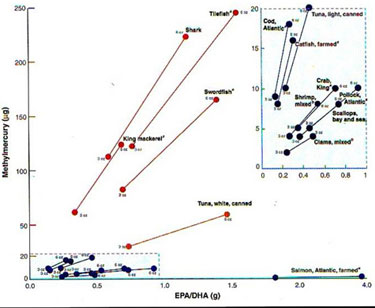With a click of her mouse, EatingLiberally's kat corners Dr. Marion Nestle, NYU professor of nutrition and author of Food Politics and What to Eat:)
Kat: I'm not one of those Volvo-driving, latte-drinking liberals, but I do eat a lot of sushi. So I was sufficiently alarmed by a New York City Department of Health report last month that one fourth of New Yorkers have elevated levels of mercury thanks, in large part, to our fondness for fish.
We New Yorkers may be more full of it, but excess mercury is a problem all over the country. We know that even a small quantity of mercury can hurt cognitive development in children. And yet, a BP (British Petroleum) refinery in Indiana is still allowed to dump mercury directly into Lake Michigan, which is "a magnet for sport fishing and the source of drinking water for Chicago and scores of other communities," according to the Chicago Tribune.
So if we can't count on the EPA to, you know, actually protect the environment, we have got to be proactive and stay on top of what fish is OK to eat and what's not. You touch on this topic in your "Eating Made Simple" article in the September issue of Scientific American, in which you note that "two small servings per week of the less predatory classes of fish are unlikely to cause harm."
You're presumably talking about fish like anchovies and sardines, but they're not exactly a staple on sushi menus. Tuna, on the other hand, is. As are salmon and mackerel, which are so high in those omega-3 fatty acids that are known to benefit our brains. My own brain hurts when I try to figure this stuff out. So, seriously, how often do you eat sushi?
Dr. Nestle: I love sushi and eat it every chance I get although I try to be careful to eat it in places where I think the chefs know how to prepare it safely. I can well sympathize with your sushi-induced headache. Balancing the risks and benefits of seafood is no joke. It took me five chapters in What to Eat to deal with fish choices and it took an Institute of Medicine committee two years just to grapple with the methylmercury vs. omega-3 problem.
Personally, I'm much more worried about the risk of biological hazards -- bacteria, viruses, worms, and the like -- in sushi than I am about methylmercury, but I'm past the point of becoming pregnant. Pregnancy is the real concern. Methylmercury is not good for baby brains. It does not seem to have nearly as much effect -- except at high levels -- on adult brains.
The good news is that only five big predatory fish in the food supply that are commonly eaten accumulate high levels of methylmercury: (1) shark, (2) swordfish, (3) king mackerel, and (4) tilefish. The other common one has half the level of those four: (5) albacore (white) tuna. Everything else has much, much lower levels, as shown in this chart from the 2006 Institute of Medicine report.

The amounts in other fish are so low that the chart has to make the scale bigger so you can see the difference.
The methylmercury story is one place where I think government agencies make truly sensible recommendations. In 2004, the FDA and EPA came out with a joint advisory for people most likely to suffer bad effects from eating too much methylmercury: pregnant women, women likely to become pregnant (because methylmercury accumulates) and small children. These agencies say that if you are in this category, don't eat those five fish. Period.
If you are not in those categories, eating a serving or so of those fish once in a while seems OK. In any case, there isn't all that much fish in sushi. The fish portions are tiny so the amounts of methylmercury will be tiny. That leaves plenty of sushi to enjoy. Salmon, for example, is very low in methylmercury and so are shrimp, eel, and lots of other kinds I like. And, being an adult, I will occasionally indulge in a piece of tuna.
With that said, I'm fussy about the possibility of biological contaminants in sushi. Here too, the FDA has sensible things to say. The FDA tells pregnant women, young children, the elderly, people with compromised immune systems, and those with low stomach acidity not to eat raw seafood -- ever. If you aren't in those categories, and want to reduce your risk of picking up some nasty parasite or bug, it helps to make sure the fish was solidly and deeply frozen before you eat it. Even then there's a risk, but a much smaller one. So I like to be sure I'm eating sushi in a place with a well trained chef who knows food safety rules.
But the whole subject makes me really angry. About 40 percent of the methlmercury in fish gets into their waters from coal-burning power plants (the rest comes mostly from volcanoes and natural sources). We know perfectly well how to clean up emissions from those plants before they dump toxins in land and water. This is the best example I can think of to illustrate why changing the environment is so much more important to health than individual choices. You don't like methylmercury in your fish? Write your congressional representatives and tell them to stop delaying controls on emissions. Now.
(For more on sushi safety, the Colorado Health Department has a neat page with many links to other sources of information on mercury, bacterial, and other kinds of problems with fish.)